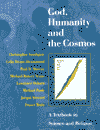Science and Religion - Conflict or Dialogue?ConflictIn John Updike’s novel Roger’s Version a character says:
DialoguePope John Paul II wrote in 1988 that:
The character in Updike’s novel talks of theology in progressive and inevitable retreat before the dominance of science. There is a conflict in which one subject is overwhelming the other, forcing it off its territory. See the ‘conflict’ or ‘warfare’ hypothesis. The tone of the Pope’s letter is very different, implying a common territory on which may take place exploration and dialogue. See possibilities for dialogue. The Pope renounces the idea that theology might seek to preserve itself from the ‘harryings’ of science by seeking isolation. These two extreme viewpoints will be with us throughout this look at the interactions between the sciences and religion. To explore the range of possible interactions further see typologies relating science and religion. To understand more about how science and theology function in the popular imagination see ‘the words ‘science’ and ‘theology’ in popular usage. To clarify how the science-religion relationship can be understood see: Different sciences - different relationships, A ‘special relationship’? and The metaphor of the maps. To explore how the debate has developed in recent years go to key figures and developments in the science-religion debate.
Email
link | Feedback | Contributed by: Dr. Christopher Southgate
|






